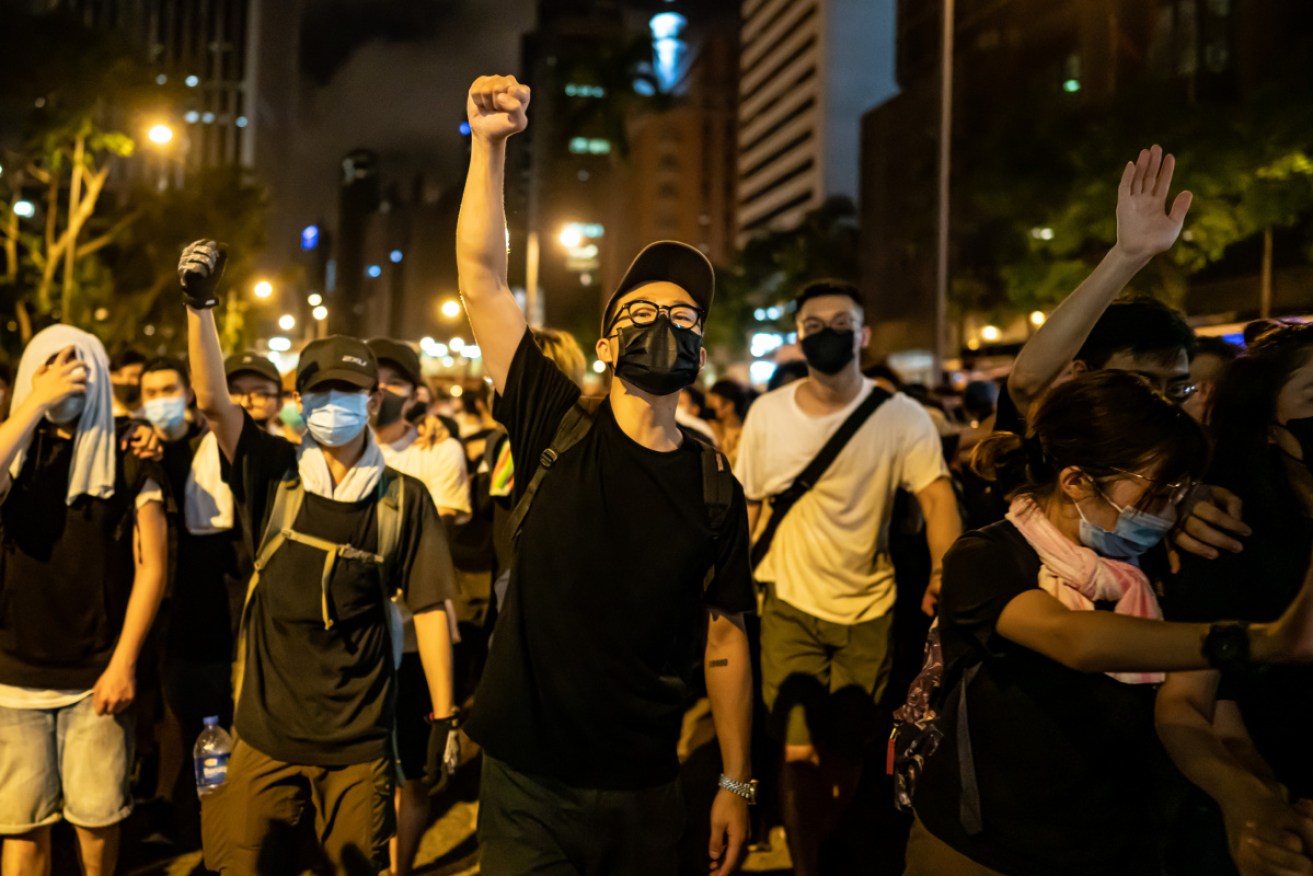‘Absolute chaos on the streets of Hong Kong’ as protest turns violent

Violent incidents occurred during repeated clashes between protesters and police. Photo: Getty
Chaos erupted on the streets of Hong Kong as police clashed with pro-democracy campaigners after hundreds of thousands of people marched through the city to protest against a proposed extradition deal.
Several hundred riot police armed with batons, shields, tear gas guns and pepper spray sealed off the Legislative Council as a similar number of protesters charged their lines shortly after midnight.
Police used batons and fired pepper spray at protesters, who still managed to close off part of a nearby road. Several people on both sides appeared to be injured, and ambulances were called. Metal barriers were left twisted and torn in the clashes.
The Legislative Council is where debates will start on Wednesday to pass new legislation to allow the Hong Kong Government to extradite suspected criminals and fugitives on a case-by-case basis to countries where it does not currently have extradition treaties — including mainland China.
Earlier on Sunday, hundreds of thousands had jammed Hong Kong’s streets to protest against the bill in the biggest demonstration in years. Many said they feared it put the city’s vaunted legal independence at risk.
The older generation of Hong Kong protesters left earlier in the evening while a younger crowd made up of university students and young professionals continued to rally.
The rallies — and the violence — plunged the global financial hub into a fresh political crisis, with marchers and opposition leaders demanding the bill be shelved and that the city’s Beijing-backed chief executive Carrie Lam resign.
After seven hours of marching, organisers estimated 1,030,000 people took part, far outstripping a demonstration in 2003 when half that number hit the streets to successfully challenge government plans for tighter national security laws.
A police spokesman said police estimated 240,000 were on the march “at its peak”.
“She [Lam] has to withdraw the bill and resign,” veteran Democratic Party MP James To told crowds gathering outside the council and government headquarters in the Admiralty business district on Sunday night.
“The whole of Hong Kong is against her.”

Police used batons, fire hoses and pepper spray as the protest raged into the evening. Photo: Getty
Ms Lam had yet to comment on the rally and the future of the bill, which could be passed into law by the end of June. She has tweaked the amendments but refused to pull the bill, saying it is vital to plug a long-standing “loophole”.
State-owned news outlet China Daily editorialised that “foreign forces” were trying to cause chaos and argued the law was much needed.
“Any fair-minded person would deem the amendment bill a legitimate, sensible and reasonable piece of legislation that would strengthen Hong Kong’s rule of law and deliver justice,” the editorial said.
“Unfortunately, some Hong Kong residents have been hoodwinked by the opposition camp and their foreign allies into supporting the anti-extradition campaign.”
The case that sparked furore
A 20-year-old man, Chan Tong-Kai is at the centre of the firestorm around the bill.
Ms Lam proposed the legislation earlier this year after Taiwan requested his extradition to face charges of allegedly murdering his pregnant girlfriend while on holiday there.
In April, he was convicted by a Hong Kong court of money laundering — in relation to his girlfriend’s murder — but authorities were unable to charge him with murder in local courts.
With Chan’s release is possible as early as October having already served time, the Hong Kong Government is using the case to push for the extradition law amendment to pass by next month.
The demonstration capped weeks of growing outrage in the business, diplomatic and legal communities, and human rights groups, which fear corrosion of Hong Kong’s rule of law and the lack of a fair and open legal system on the mainland.
Chants of “no China extradition, no evil law” echoed through the streets of the high-rise city as marchers snaked through the Causeway Bay and Wanchai shopping districts.
Some carried yellow umbrellas, a symbol of the 2014 pro-democracy Occupy protests that choked city streets for 79 days.

Protest organisers estimated more than a million people took part in the protest. Police sources said peak attendance was no higher than 261,000.
Protests against extradition law spill into Sydney
A group of 1,000 protesters gathered in Sydney on Sunday to urge the Australian Government to condemn the proposed new law.
Accountant Ida Lee said she valued her freedom of speech, and that expatriates feared being seized by China as they travelled through Hong Kong.
“Ordinary people like me, I think, will live in perpetual fear of breaking some law in China, and as we’re passing through Hong Kong we’ll be arrested and extradited,” she said.
Amendment will ‘take away the firewall’
When Hong Kong was transferred to China in 1997 under the “one country, two systems” deal, the territory was guaranteed a high degree of autonomy, allowing it to keep its own political, legal and economic systems until 2047.
“The whole essence of one country two systems is you have two separate systems, in particular the legal system,” Ms Eu said.
“What this amendment is going to do is take away the firewall, take away the protection between the two different legal systems.”
But the Government argues the laws are necessary to fight crime, including drug manufacturing and trafficking, money laundering and firearms smuggling.
-ABC







